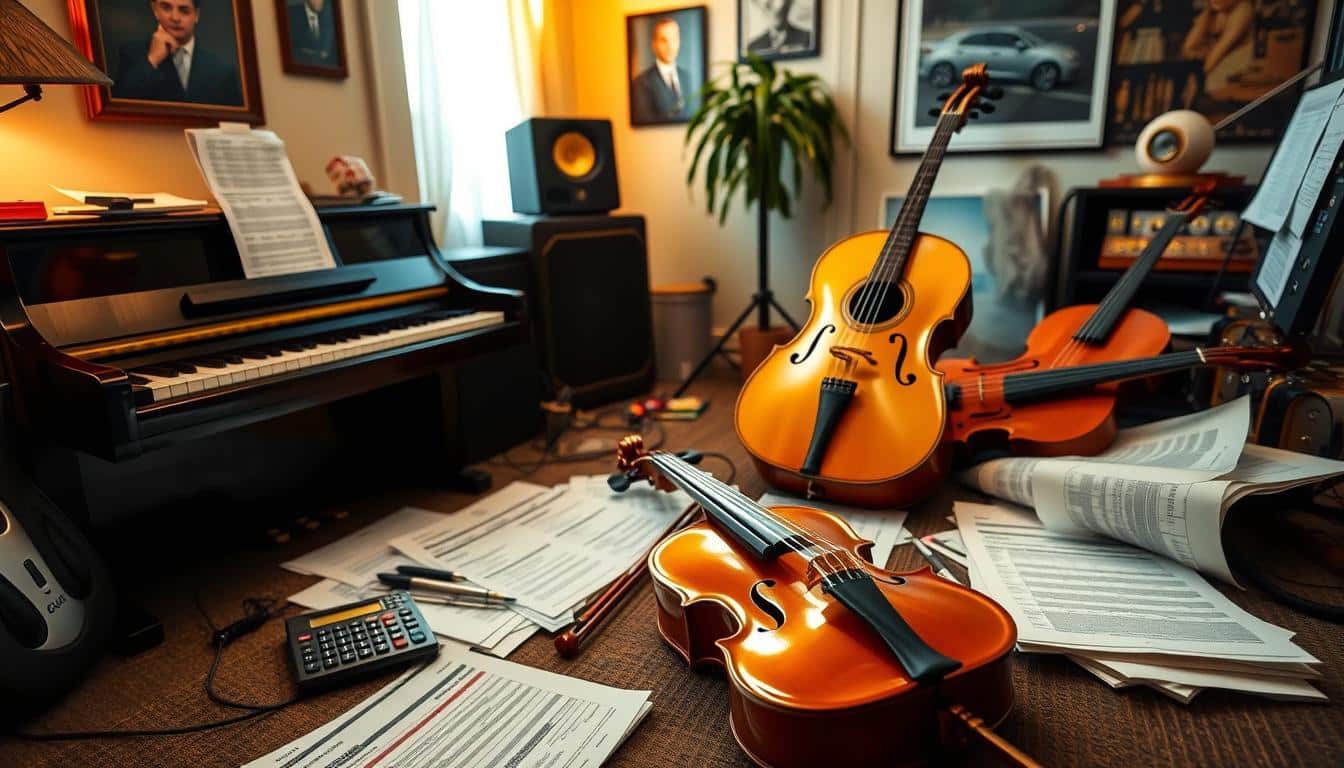Are you improving your musical skills? Tax savings can get a bit tricky. The IRS usually sees music lessons as a hobby, not a way to save on taxes. If you’re not making money from your music, you won’t get a tax break. This is true whether you’re singing in church or playing with friends.
But don’t give up on music yet. There are special cases where lessons might be deductible. For instance, if music lessons help with medical issues or special needs, you might be able to deduct them. For example, clarinet lessons could help fix an overbite or help with learning disabilities, making them eligible for deductions.
Also, don’t overlook state tax laws. They might offer their own tax breaks for music lessons. So, don’t rule out the chance to lower your taxes just yet. Talk to tax experts who know about these special deductions.
Key Takeaways
- Music lessons are generally considered a hobby, not a tax deduction.
- Deductions may apply if lessons are for medical or special needs.
- State-specific tax laws might offer additional opportunities for deductions.
- Consulting tax professionals can uncover potential tax-saving avenues.
- Understanding IRS rules can help identify legitimate deductions for music expenses.
Understanding Music Lessons and Tax Deductions
Music education can be both enriching and beneficial, but does it get a nod from the IRS? Exploring music lessons tax write-offs can reveal tax savings for music lessons that many don’t know about.
General Rule: Hobby vs. Business
The IRS has a clear rule: if music lessons are just a hobby, they don’t qualify for a tax write-off. But, if your music lessons help you earn income, they might be tax-deductible. This is for those who see music as a business, potentially leading to big tax benefits.
Medical or Special Needs Deductions
For many parents, music is key to their child’s growth. Music lessons for kids with special needs or medical conditions could be tax-deductible as medical expenses. Adults with music therapy needs might also get these deductions, making tax savings for music lessons more substantial.
State-Specific Allowances
Tax rules vary by state, and music lessons are no exception. Some states offer special tax breaks for music lessons under certain conditions. It’s wise to check with your state’s treasury department or a tax expert to find these deductions and boost your savings.
Are Music Lessons Tax Deductible for Professional Musicians?
For the entrepreneurial musician, claiming music lessons as a tax deduction is tempting. You need to meet certain requirements to show your music is a business, not just a hobby. This means you must have a formal setup like an LLC or partnership.
Music as a Business
To get the IRS to agree, you need to show your music is a serious business. This means having your finances in order and proving you’re dedicated. You can deduct things like studio fees, instrument costs, travel, and even guild memberships.
Savvy musicians keep their personal and business money separate. This helps you save on taxes. It’s important to keep track of your expenses to make the most of your deductions.
Steps to Qualify as a Business
- Formalize your musical entity with a specific structure like an LLC or partnership.
- Keep detailed records of all expenses, proving they’re essential for maintaining and improving your skills.
- Maintain separate accounts for personal and business finances to avoid mix-ups.
- Track deductible expenses like studio fees, travel, and instrument costs. Note that there are 17 specific deductions you can monitor, from mileage for business trips to home office expenses and promotional costs.
- Consult tax experts to navigate through the complex composition of your deductions.
By documenting your expenses and keeping your business finances in order, you can confidently approach the IRS with your claim. Tax experts can help you navigate this complex composition to potentially reduce your taxable income with music lessons as a tax write-off, aligning with state and federal rules.
Conclusion
As the year ends and tax time comes, many wonder: Can music lessons be tax deductible? For most, music lessons are just a hobby and not deductible. But, if you’re a pro musician or need them for health or school, you might find deductions available.
For professional musicians, deductions can be key to their finances. Things like studio rent, equipment, utilities, repairs, and travel for work can lower your taxes. Marketing, attending conferences, legal fees, and insurance also count as deductions. Keeping good records and talking to tax pros is crucial for a good financial outcome.
Whether you’re a pro or just play for fun, understanding taxes is complex. Look into all possible deductions and state rules to save on taxes. Working with tax experts can help you find the best deductions. This way, you might get a tax break that sounds good for your wallet.








